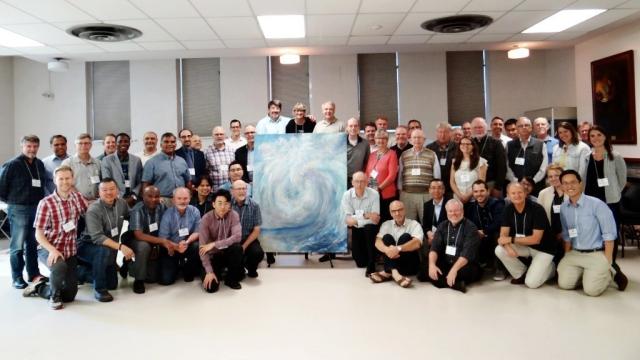
Being Fit for the Future of Mission

In late June I attended a conference in Toronto called Future Fit. This conference was the first of its kind in Canada, with 61 organizations and 92 mission leaders present. Organized by the Evangelical Fellowship of Canada and the Canadian Missions Research Forum (CMRF) with Tyndale and the Lausanne Movement, the purpose was “to reflect on the future of the missionary movement, working from the Canadian context but with the expectation that outcomes will be relevant to the global missionary movement.” In many ways, Future Fit is a response to changes in the mission landscape, which includes the apparent decline of interest in mission in the Canadian church.
The conference was birthed out of the convergence of two conversations: one from within Canada about the future of mission in the Canadian evangelical church, and the other an international conversation about emerging sending nations among international leaders of mission agencies such as OMF and Interserve. What was acknowledged in both conversations is that “missions” has changed and mission agencies need to change, as well. It was noted that “Canada is a strategic place for this discussion, with a long history of global mission engagement, a uniquely diverse population, and an increasingly secular worldview.”
What wasn’t being entertained was the idea that Canada is now a piece of mission history without a part in the future of mission. Our calling as disciples means that we’ll always have a part in Christ’s mission! Dr. Minho Song from Young Nak Presbyterian Church in Toronto presented early in the week with an encouraging message and strong case for not underestimating what the Holy Spirit can do through a few willing disciples, by recounting the stories of James Gale, Oliver Avison, and Robert Hardy, and the profound impact they had on the birth of the Korean church. Our take-away was, if God could do that, then what will he do in our day?
Over the course of the week, participants heard from five areas of the mission community: interdenominational mission agencies, denominational mission agencies, seminary and bible colleges, mission engaged churches (whether local or globally engaged), and Canadian diaspora leaders. As valuable as the information was, the opportunity to cultivate relationships has the real potential to reshape the missional landscape in a deeper more lasting way than we can imagine.
So many emerging trends and good ideas were shared during the week that it’s hard to narrow it down to a few, but here are three big ideas which may play a part in shifts in mission in the coming years.
Collaboration
More and more, collaboration is becoming an essential part of effective Kingdom ventures. Collaboration doesn’t just happen. Collaboration clears the path for streamlining services and resources. As Eldon Porter from Linking Global Voices shared, we typically start with communication between parties, which leads to cooperation, and finally results in full-fledged collaboration. The essential building block of collaboration today is relationship. In the past, most collaborative efforts seemed to focus on outcomes, and included formal contracts; today, there seems to be a groundswell of efforts that ebb and flow based on affinity. In hindsight, we must take to heart David Hearn’s (C&MA Canada) caution to never do mission without intimacy with Jesus, regardless of the appeal of the outcome or the affinity we share.
Networks
In many ways the future of mission is in networks. Networks are made of autonomous entities that join around something they share in common. From this definition, a network and movement are similar. Seeing mission advance through networks is exciting because there is a place for the individual, the para-church organization, and the local church. Each network, made up of multiple parts, can make use of a variety of talents and gifts that a single organization might be unable to accommodate. Eldon Porter notes that, in his experience, well-run networks always produce partnerships. Networks can go a long way towards countering the popular perception that para-church organizations compete rather than cooperate. Networks by their nature mean that missions is being conducted from an ethos of cooperation, which can be a helpful counterpoint to the use of exploitative power that often accompanies a corporate mentality.
Sending and Receiving
When we think of mission agencies like SIM, we often think of them in their sending capacity. They think of themselves in this light as well, but that’s changing. Many of the Canadian sending agencies are now exploring how they can become receiving agencies. With the shift of the center of Christianity to the Global South and globalization, we can expect polycentric mission to become more of a reality. When there is a decline in the number of long-term missionaries leaving Canada for international destinations, the slack in the system might be re-oriented to helping international missionaries get settled well in Canada, so that their success increases. Instead of being disassociated from the impact of the missionary by geography, our Canadian church can see and experience the work of the missionary first-hand, which could have an impact on support for mission in all its dimensions. What seems to be common to these three big ideas is that through them more and diverse people are being invited to participate in Christ’s mission. We need to get over our inclination to dump mission on the professional full-time religious worker, and begin to live missional lifestyles, regardless of our vocation. Praying and giving are not the only options for Canadians when it comes to mission. If we maintain an openness to collaboration, building networks, and an acceptance that Canada is a mission receiving nation, we’ll find the mission landscape in Canadian churches transformed, and talk of decline may become a distant memory.
Mission Central and Missions Fest Vancouver exist to foster collaboration and networking of people who are passionate about serving Christ in his mission.







